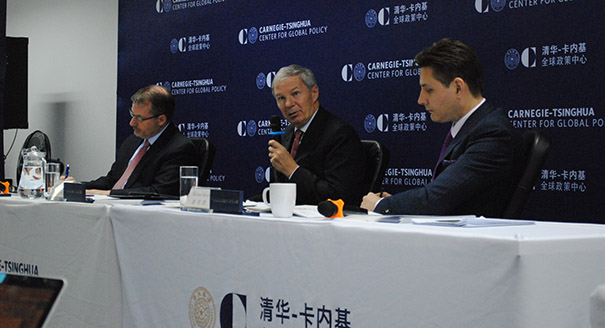Registration
You will receive an email confirming your registration.
Over the course of 2017, the world has seen the United States step back from its role in global governance and walk away from deals like the Trans-Pacific Partnership and the Paris Climate Agreement. This retreat has raised questions about how the United States will respond to global crises escalating around the world. From violent extremism to displaced refugees, 2017 has seen far-reaching strife and calamity that will still need to be addressed in 2018. Against this backdrop, China is making further inroads in expanding economically and asserting itself in global affairs, most recently by proposing a three-phase solution to the Rohingya crisis in Myanmar. At the same time, it has to contend with ongoing disputes in its own backyard. What might the world look like in the year ahead in terms of hotspots of conflicts and how should governments and institutions tackle pressing crises?
Carnegie–Tsinghua Center Director Paul Haenle moderated a discussion with Jean-Marie Guéhenno, president and CEO of the International Crisis Group (ICG), and Michael Kovrig, ICG’s senior adviser for North East Asia, on some of the major crises in the world today and what role China could play in solving them. This event was off the record.
Discussion Highlights
- The Challenges of Modern Conflicts: A panelist said that five principal factors pose challenges to resolving today’s conflicts and global crises. Conflicts, the panelist said, have become multilayered and understanding their driving factors requires examining actors on a local, regional, and global level. Rather than conflict zones staying isolated, growing global interconnectedness means that local conflicts can lead to regional and intercontinental volatility. The panelist said that this same interconnectedness has heightened the viability of transnational movements and amplified their ability to infect faraway conflicts. As globalization grows, international politics are increasingly driven by fragile domestic politics. Finally, the discussant argued that instruments and principles designed to mitigate past global challenges are ill equipped to deal with those of the modern era, resulting in a peacekeeping framework that often leads to international uncertainty.
- The Implications of an Ongoing U.S. Retreat: A discussant argued that the ongoing realignment of the United States within the international community is part of a larger trend that began under the Obama administration as a response to the unilateral overreach of the Bush administration. However, the panelist noted that a key difference between the Obama and Trump administrations is not in the direction of the trend, but its implementation. The discussants said the Obama administration recognized the limitations of U.S. power and worked to avoid a potential vacuum of leadership in the global community by strengthening international organizations. The panelist said that the Trump administration has maintained a similar skepticism for the role of U.S. leadership but has simultaneously withdrawn support for multilateral global initiatives. The panelist warned that this trend could destabilize the current global consensus on conflict resolution and likely weaken the international community’s ability to respond to crises.
- Building International Consensus on Conflict Resolution: A panelist said that the Trump administration’s increasingly narrow view of national self-interest has accelerated a U.S. withdrawal from the unipolar international order of the post-Cold War era. The discussant proposed that stakeholders such as the EU and China desire more predictability as the world moves towards multipolarity, but questioned whether they share a sufficient degree of understanding in the areas of peace and stability to craft a consensus framework. Nonetheless, the panelist emphasized the need for the global community to find a balance between interventionism and noninterventionism in conflict resolution. While criticizing the Western tendency toward the former as ineffective, the discussant also argued that China needs to evolve beyond its conservative interpretation of peacekeeping.
- China’s Growing Efforts in Peacekeeping: A panelist said that China’s hesitancy to engage in more assertive peacekeeping efforts is a byproduct of its noninterventionist policy. But the discussant argued that China’s movement toward growing international engagement has similarly coincided with greater involvement in UN peacekeeping campaigns, most notably in Africa and Haiti. While Chinese aid was initially limited to medical, logistical, and engineering units, the panelist said that China has increasingly committed police and military units, suggesting experimentation in its peacekeeping policies.
- The Future of Leadership in Crisis Management: A panelist said that China’s traditional posture as a reactive international actor creates difficulties for predicting the future of Chinese leadership in global conflict resolution. The panelist cautioned China against adopting a policy of dictating norms and behavior as a means of gaining influence and stressed the need for increased global dialogue that readjusts the international standards for conflict resolution in a way that accommodates both China and the West. The panelist reiterated that the two regions maintain notable differences in their approaches to security and sovereignty, which if left unresolved will lead to heightened tensions.
Jean-Marie Guéhenno
Jean-Marie Guéhenno is the president and CEO of International Crisis Group. He previously served as the United Nations’ under secretary-general for peacekeeping operations from 2000 to 2008.
Michael Kovrig
Michael Kovrig is a senior advisor for North East Asia at the International Crisis Group. He previously served as a Canadian diplomat in Beijing and Hong Kong.
Paul Haenle
Paul Haenle is the director of the Carnegie–Tsinghua Center for Global Policy based at Tsinghua University in Beijing. Haenle’s research focuses on Chinese foreign policy and U.S.-China relations.
